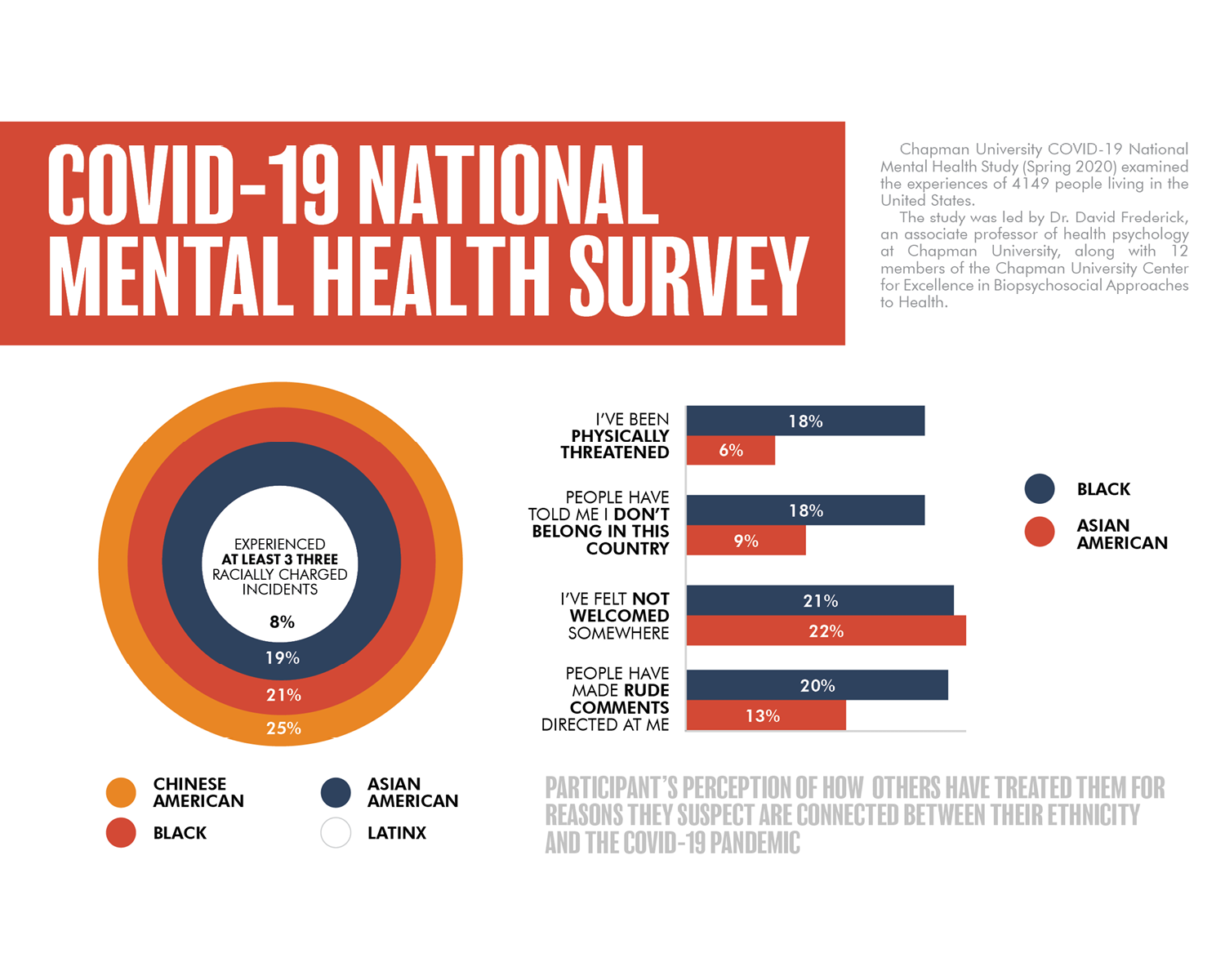Chapman study explores xenophobia toward Asian Americans
Sophomores Jenny Yen and Eva Wong, who identify respectively as Chinese American and mixed Asian, were hardly fazed when told of reports from a Chapman national mental health survey that over 50% of Asian Americans reported experiencing at least one instance of racism toward them or their families during the COVID-19 pandemic. Graphics by HARRY LADA, Art Director
Jenny Yen still thinks about that look.
It was March, and Chapman sophomores Yen and Eva Wong – who identify respectively as Chinese American and mixed Asian – were shopping for groceries in Orange during the inception of the COVID-19 pandemic. They exchanged laughs while searching for greens in the produce aisle when they noticed a white woman staring at them 10 feet away. So Yen flashed her a smile.
“The look she gave me … she looked so disgusted,” Yen said, recalling the moment. “Like I, myself, was going to steal the air out of her lungs somehow.”
The woman grabbed her purse, grabbed her cart and wheeled away.
“I remember walking through the grocery store, just thinking, ‘Why?’ I just smiled at you, like... I just smiled,” Yen said in disbelief. “(To her), I wasn’t a human who was trying to get groceries. I was some mystical beast.”
It might be a story like Yen and Wong’s; it might be hearing the comment “go back to your country”; it might be an instance of genuine physical violence. No matter the experience, xenophobic acts toward Asian and Chinese Americans during the COVID-19 pandemic have been extremely prevalent. As proven by a spring national mental health study released by Chapman University faculty members, we may even be underestimating the sheer amount of these experiences.
Developed by 12 members of Chapman’s Center for Excellence in Biopsychosocial Approaches to Health (CEBAH), the “Chapman University COVID-19 Mental Health Study” touched upon topics such as beliefs and fears associated with the pandemic, romantic relationships in the time of quarantine and racism. In particular, out of the 309 surveyed Asians, 100 of them identifying as Chinese, 32% reported experiencing at least one instance of racism toward them or their families during the pandemic, while 19% reported experiencing at least three.
“It’s really normalized. Sometimes, when the things that we say happen, people don’t really take them seriously,” Yen said. “If we say this happened: ‘Shove it off; just deal with it.’ So it’s always like these racism Olympics happening, like ‘Well, you’re not getting murdered or beaten or raped or chased, so it’s not as bad; you shouldn’t come clean about it.’”
In other areas that researchers examined, the “Chapman University COVID-19 Mental Health Study” found that political ties influenced polarization amongst respondents’ views on President Donald Trump’s handling of the coronavirus.
Co-author Jennifer Robinette said her students who identify as Asian American have told her about instances where they’ve been walking down the street and a person walking toward them will cross the street, saying things such as, “They’re Asian; they might have COVID.” And when designing the overall survey, David Frederick, the lead author of the study, had a conversation with one of his former Asian American students about xenophobic interactions that her and her friends had experienced or witnessed.
“Seeing how this affected her prompted me to make sure that we included measures on people's experiences of COVID-19 related ethnic discrimination or prejudice, and also ask people to share specific incidents,” Frederick told The Panther. “I had expected Asian Americans to report these experiences, but I was surprised at just how common the experiences were.”
Yet, when she was told the potentially inflammatory details of the testimonials, Yen seemed hardly bothered; she felt desensitized, numb even, she explained. And when she told her parents about her grocery store interaction, they had a similar reaction.
“My mom specifically said, ‘When I go to the grocery market, people just slowly inch away from me. It’s normal; just deal with it,’” Yen said. “I was just like, ‘This is not normal. This shouldn’t be normal.’”
Both Yen and Wong brought up the stereotype of Asian Americans as the “model minority:” docile, nonconfrontational. That wasn’t necessarily true, both explained. There just happened to be specific, life-threatening reasons – particularly for many first-generation citizens — for them to keep their heads down.
“If you cause a big scene, if (for example) it’s an Asian woman against a white woman and there’s a confrontation in public, no matter if the white woman started it, the Asian woman is always at that threat of deportation,” Wong said.
Can this trauma influence mental health among Asian Americans? Well, Robinette – whose primary research focuses on neighborhood dynamics – explained that as a part of the Chapman study, she found that those who felt less comfortable in their neighborhoods were experiencing more negative mental health effects and depressive symptoms.
Thus, in moving forward from this pandemic, seeking counsel could be helpful. In the case of students at Chapman, Director of Student Psychological Counseling Services (SPCS) Andrew Kami told The Panther that SPCS believes BIPOC students, as well as other minority groups, have been particularly affected during the pandemic. He said their services are prepared to offer support on any issues raised surrounding topics of race, culture or identity.
At the end of the day, this period of xenophobia may finally emphasize a necessary systemic change in America, across all minority groups. Wong told The Panther that a way for Asian Americans to create that change was to support the Black Lives Matter movement.
“The plight and struggle (toward equality) of Asian Americans would not be possible without Black liberation movements,” Wong said. “The racism that we face is from the same institution … if we as Asian Americans can band together with the Black Lives Matter movement, if we fight for Black liberation, people will realize that the issues that we are facing have similar roots.”


